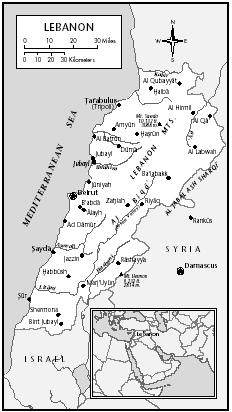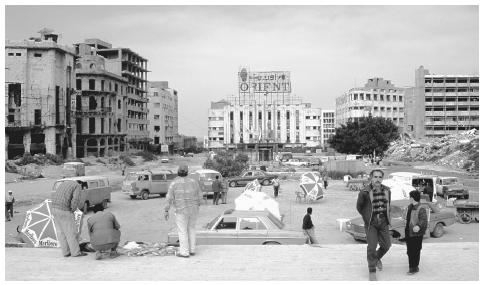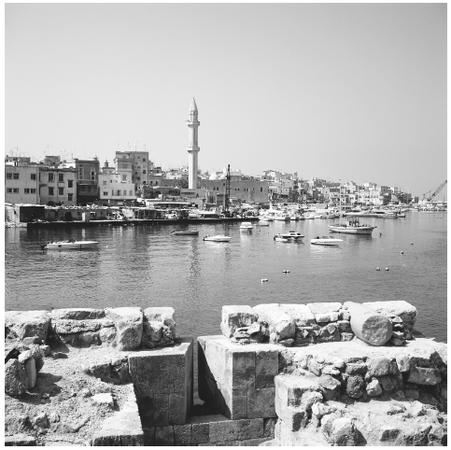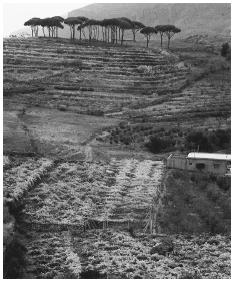Lebanon
Culture Name
Lebanese
Alternative Names
The Republic of Lebanon
Orientation
Identification. Loubnan derives from the Phoenician for "white mountain" and denotes Lebanon's mountains, some parts of which remain snow-covered all year.
Location and Geography. Lebanon is bounded on the north and east by Syria, on the west by the Mediterranean, and on the south by Israel.
Lebanon consists of two mountain chains, the Lebanon and the ante-Lebanon; a narrow coastal strip, where all the major cities lie; and a fertile plain, the Bekaa valley, which lies between the two mountain chains and provides most of the local agricultural produce.
The capital, Beirut, was chosen for its ideal location on the Mediterranean and acts as the heart of Lebanon's banking industry, tourism, and trade. The port of Beirut is the busiest and most important in the country.
Demography. As of 1994, the population of Lebanon was estimated to be 3,620,345. Ninety-five percent of the population is Arab, 4 percent is Armenian, and other ethnic backgrounds comprise the remaining 1 percent. The birth rate is 27.69 per thousand and the death rate is 6.55 per thousand. The average life expectancy for those born at the end of the twentieth century was 69.35 years.
Whereas at independence, gained in 1943, the population was one-half Christian and one-half Muslim, a higher birth rate among Shiite Muslims upset this balance and was one of the causes of the civil war. Estimates in the 1990s reveal a population composed of nearly 70 percent Muslims and 30 percent Christians.
Linguistic Affiliation. Languages spoken include Arabic, French, English, and Armenian. There are many accents in Lebanon. The Beirut accent is the mellowest and most highly regarded, while country accents are harsher. Accents are a much higher indicator of social status than they are in the United States.
Lebanon has seen many invasions, which introduced new cultures and languages. The Canaanites, the first known settlers in the country, spoke a Semitic language. In the Hellenistic era Greek was introduced and spoken along with Aramaic. Latin later became common, and finally the Arab invasion in the eighth century introduced and assured the hegemony of Arabic. Today, all Lebanese speak Arabic; most of them, especially the upper and middle classes, speak French; recently, English has become increasingly important.
Symbolism. The cedar in the center of the Lebanese flag is the symbol of six thousand years of history: the cedar was Lebanon's chief export in ancient times. The location of the cedar tree in the middle of the flag touching the upper and lower red stripes is also a reminder of Lebanon's constant troubles because the red stripes represent the blood spilt by the Lebanese throughout their history.
The country's religious diversity has led to the transformation of many religious holidays into national ones. Additionally, the new government has placed much emphasis on secular holidays, particularly Id Il-Jaysh , which celebrates the accomplishments of the Lebanese Army.
History and Ethnic Relations
Emergence of the Nation. The first cities to emerge in Lebanon were built by a maritime people, the Phoenicians, who determined the cultural landscape

In the medieval period, Christian minorities often helped the Crusaders. This created a close relationship between Lebanese Christians, particularly the Maronites, and Europe, particularly France. These ties persisted and grew stronger, especially in the eighteenth century, and were a major factor in the creation of the modern Lebanon.
After World War II, Lebanon was placed under French mandate. Later, France gave Lebanon a parliamentary system and, for the first time in the Middle East, created a nation where Christians had a strong political presence: each government office was apportioned to a representative of the country's main sects, with the presidency reserved for the Maronite Christians. The privileging of Christians in governmental positions was one of the main reasons for the civil war, when the population percentage shifted in favor of the Muslims.
National Identity. Although the various communities in Lebanon share a similar ethnic background, the fact that they are of different religions and they define their cultural and often geographical boundaries through religious affiliation has always been a source of discord. On numerous occasions religious diversity has eclipsed the sense of belonging to a common state. When the civil war erupted in the mid-1970s, all formerly suppressed differences and incongruent loyalties emerged and came to dominate the political arena, fuel hatred, and provide an easy ground for outside powers to interfere in the country's affairs.
A tired Lebanon emerged in the early 1990s. Under the Ta'if agreement the civil war ended, the Christians lost some of their political power, and a new government of technocrats came into power with reconstruction highest on its agenda.
Today the new moderate government is seeking to secularize political offices and fight corruption.
Ethnic Relations. There is a feeling today that most Lebanese are tired of the war and are trying to put their differences behind them as they reconstruct their country, which is currently under Syrian hegemony.
Lebanese are present throughout the world. Since they have always been at the border between East and West, they often blend easily with the societies to which they migrate.
Urbanism, Architecture, and the Use of Space
Most of Lebanon's population lives in the main cities of Beirut, Tripoli, and Sidon which are densely populated.
Cities in Lebanon suffer from a lack of space. Most people live in apartments. Furniture is often a mixture of Arabic, Italian, European, and American styles. Apartments are usually decorated in western style: couches are placed against the walls, end tables are common, and walls are often adorned with framed paintings and tapestries.
Lebanese people gather for sports, political events, and concerts. The Lebanese prefer to hold

Government buildings are generally simple and do not display reliefs, paintings, or slogans. Government buildings are often surrounded with small flowerbeds and/or trees.
Food and Economy
Food in Daily Life. Lebanese cuisine is Mediterranean. Pita bread is a staple. The Lebanese enjoy hummus (a chick pea dip), fool (a fava bean dip), and other bean dishes. Rice is nearly a staple, and pasta is very popular. Salted yogurt is common in many dishes. Red meat and chicken are common but are usually eaten as part of a dish. Pork is less popular, since it is forbidden under Islamic law.
Eating in Lebanon is tied to family: people almost never eat alone. The Lebanese consider eating out a social and almost aesthetic experience. Hence, restaurants usually have a pleasant view, of which Lebanon's geography affords many.
Food Customs at Ceremonial Occasions. Ramadan , the Muslim month of fasting, is the occasion for large meals at sundown. Soup, fatteh (a chick pea and yogurt dish), and karbooj (a nut-rich pastry) are especially eaten during Ramadan.
During Lent, Christians eat meatless dishes and at Barbara (Halloween) they eat a variety of wheat-based dishes.
Basic Economy. Although Lebanon produces and exports much of its agricultural produce, it still imports much of what its inhabitants consume, such as rice and some vegetables. Since most people live in city apartments, the only Lebanese who grow their own food live in mountain villages and some coastal towns.
Land Tenure and Property. Private property is very common and encouraged in Lebanon, although the government still owns most public services. Land laws are similar to those in France and the United States, but both religious and secular courts govern land inheritance.
Commercial Activities. Lebanon produces and sells oranges, apples, and other fruits, as well as a variety of beans and vegetables. It is also becoming a Middle East hub for a number of computer software and hardware manufacturers. The banking industry, which was very prominent before the war, is once again rising to occupy a privileged place in the region.
Major Industries. The major industry is the manufacture of concrete and building material, to serve local needs. There are also some small factories that produce clothing and fabrics.
Trade. Lebanon sells fruits and vegetables to neighboring Arab countries as well as to Italy, France, and the United States. Wine is produced in the Bekaa and exported to France. Lebanon imports fruits and vegetables from Europe, North Africa and the Middle East; crude oil from Saudi Arabia and Kuwait; and electric and electronic gadgets and cars from Europe, Japan, and North America.
Division of Labor. Adolescents in Lebanon rarely work. The working population is usually 18 years and older. Lebanon is mainly a capitalist country, and the price of living is quite high. Lebanon is rebuilding itself; construction sites are everywhere.
Construction companies prefer to hire workers from Syria or Egypt, who will accept a wage of about $100 (U.S.) a month, an insufficient wage for a Lebanese.
Social Stratification
Classes and Castes. There is no caste system in Lebanon. Money is now the most important factor in determining class lines. The middle class suffered a great loss of wealth during the war, and the gap between the very rich upper class and the lower class has widened. As a result, there have been numerous strikes and demonstrations. Differences in wealth and status often occur along religious and family lines.
Symbols of Social Stratification. All Christians and most Muslims who live in the cities wear European style clothes. In poorer Muslim towns and in some Muslim areas in the main cities, one may still find the Muslim chador (the veil traditional Muslim women wear). In the countryside, women sometimes wear traditional colorful skirts and men wear a traditional serwal (baggy trousers).
Political Life
Government. Lebanon is a democratic republic with a parliament, a cabinet, and a president, although power is divided along religious lines. The President (a Maronite Catholic), who lost part of his executive power after the war, is the head of state; the Prime Minister (a Sunni Muslim) is the head of government and chairs the Cabinet; the Speaker of the House (a Shiite Muslim) presides over Parliament, which passes the Cabinet's bills and elects the President.
Leadership and Political Officials. There is much nepotism in Lebanon. However, the political spectrum is very wide: Lebanon boasts a strong communist party, the Syrian Nationalist Party, and the last Phalange party is still in existence.
Each party has its own newspaper and, at least during the civil war, its own television station.
Social Problems and Control. Lebanese civil law is based on the French Napoleonic law. Police as well as the Forces of General Security uphold the law on the streets. People rarely take the law into their own hands, except when it came to opposing ideologies during the civil war. As a result, the crime rate in Lebanon is very low.
Military Activity. The Lebanese Army was highly divided along religious lines during the civil war. Today, the government is rebuilding the army and trying to modernize it.
Social Welfare and Change Programs
Lebanon has a relatively good health care program and some free hospitals.
Unemployment is high in Lebanon and, at least according to the IMF and other international organizations, the government, which is struggling to rebuild the country's infrastructure, does not offer sufficient help for the unemployed.
Nongovernmental Organizations and Other Associations
There is a considerable number of nongovernmental organizations in Lebanon, many of which, such as Friends of the Disabled, welcome members from all religions. A number of independent organizations help the poor.
Many international organizations, such as the World Health Organization (WHO), have offices and activities in Lebanon.
Gender Roles and Statuses
Division of Labor by Gender. The marketplace traditionally has favored men, and more women stay at home than men. Women are allowed to vote, work, attend school, and participate in all forms of public life, but they tend to occupy traditionally

The Relative Status of Women and Men. Men hold higher social status than women because of the omnipresence of patriarchal religions in Lebanese life. Family is still stressed, as is the woman's role as a nurturing mother. However, many women have broken traditional boundaries and entered the political, artistic, and literary environment, especially in Beirut and other major cities.
Marriage, Family, and Kinship
Marriage. Arranged marriages are rare, although they still exist. The country's present economic crisis has rendered money, a secure job, and a home big factors in contracting marriages.
Polygamy is legal among Muslims; however, it holds a social stigma, and very few people choose this lifestyle.
Religious courts decide on issues of marriage and divorce. Divorce is easy among Muslims, harder for Orthodox Christians, and most difficult in Maronite communities. The divorce rate remains very low.
Domestic Unit. Most household units are made up of a nuclear family. However, the extended family is also very important and often functions as a social security system.
In the household, the husband and wife share authority, although wives usually wield more influence over children and in various household matters.
Inheritance. Inheritance laws are the affair of the various religious courts, which usually favor male heirs. In villages, land is the most important inheritance, whereas apartments, money, and privately-owned shops constitute the bulk of inheritance in the cities.
Kin Groups. After the family, a person's loyalty is usually with members of his/her own religion who inhabit the same town. However, marriage between different religious groups has become frequent, and at the end of the twentieth century there was an effort to pass a law legalizing civil marriages which may undermine the traditional religious and communal boundaries.
Socialization
Infant Care. Infants are usually placed in cribs and playpens, and they have their own small bedrooms. Kindergartens and babysitters are becoming more common as many women today work outside the house. Quite often grandparents or members of the extended family will help care for a baby.
Child Rearing and Education. Education is very important in Lebanon. Many parents prefer to place their children in the more expensive religious private schools, where they may receive moral guidance.
Children are encouraged to learn and to be quiet. Parents are usually strict and demand great devotion. Lebanese children grow up with deep respect for their parents.
Higher Education. Higher education is highly encouraged in Lebanon, which still has some of the

Etiquette
The Lebanese are very gregarious. The souks (markets) are always crowded; shopping downtown is very popular, as is strolling with friends along the busy streets. Lebanese people usually sit close together and interact vivaciously.
Manners are important and are highly influenced by French etiquette, especially in matters of dress, address, and eating. Strangers as well as acquaintances greet each other respectfully, usually using French terms, such as bonjour , bon soir , and pardon .
Hospitality is very important. Travelers to Lebanon are received genially.
Religion
Religious Beliefs. Most people in Lebanon are religious and monotheistic. Lebanon is made up of Muslim and Christian sects which escaped persecution throughout history by seeking shelter in its mountains. No one religion is dominant. The country has Muslim Shiites, Sunnis, Druzes and Christian Maronites, and Greek Orthodox and Armenian Orthodox.
Religious Practitioners. Religious figures have a lot of authority in Lebanon since religious courts decide on many issues concerning individuals' rights and privileges. This authority has been slightly undermined by the civil war.
Death and the Afterlife. Funerals are usually very elaborate; people are encouraged to express their feelings of loss openly and to follow funeral processions.
All the religions in Lebanon place much emphasis on the afterlife. Individuals are constantly exhorted to live righteous lives in the present, which will allow them to enter a beauteous paradise.
Medicine and Health Care
Health care is highly developed in Lebanon. Very little belief in the efficacy of traditional medicine remains. Lebanon has more doctors than it actually needs, and hospitals are constantly trying to modernize.
Secular Celebrations
Independence Day celebrates the country's independence from France. Army Day celebrates the accomplishments of the Lebanese army. Christmas is celebrated by all Christian denominations but Muslims also participate. Id Il-Mouled celebrates the birth of the Muslim prophet Muhammad.
The Arts and Humanities
Support for the Arts. Artists are usually self-supporting, although some do receive contributions from patrons of the arts. There is no official government allocation of monies for the arts, although art schools sometimes receive government aid.
Literature. Lebanon has a long history of excellent poets and novelists. In the early years of the twentieth century, Lebanese authors took the lead in defending Arabic and its use in literary creation. Today, Lebanon still has many authors who write in Arabic as well as French and sometimes English.
Oral literature is preserved in villages, where the zajal , a form of poetic contest in the Lebanese dialect, is alive and enjoyed by everyone.
Graphic Arts. Painting is very varied and encouraged in Lebanon. French surrealists, cubists, and impressionists mostly influence Lebanese artists, who add an oriental touch to the French technique and subject matter. Many exhibits are held throughout the country, including the recently reopened Lebanese Museum in Beirut.
Traditional pottery-making is still popular in the coastal towns, such as Al-Minaa in the north, and Sidon in the south.
Local crafts are encouraged and many souks specialize in selling traditional objets d'art to tourists.
Performance Arts. Oriental and Western music are both popular. International festivals are once again very popular and offer an array of symphonies, classical and modern ballets, foreign and local dance troupes, and opera and pop singers. These festivals are usually held in open air on historic sites, such as the Roman temples of Baalbek, Byblos' crusader ruins, or Beirut's central district. Because of the diversity of the programs such festivals offer, people from all walks of life attend and interact.
The State of the Physical and Social Sciences
Schools of engineering are highly developed in Lebanon. However, they produce more engineers than the country needs, and many engineers find themselves unemployed or forced to accept menial jobs.
Social sciences are taught at the major universities; however, students are not encouraged to pursue them as they are less lucrative than other careers.
The Lebanese are encouraged to learn foreign languages and are usually bilingual.
Bibliography
Abukhalil As'ad. Historical Dictionary of Lebanon , 1998.
Abul-Husn, Latif. The Lebanese Conflict: Looking Inward , 1998.
Brody, Aaron Jed. Each Man Cried out to his God: The specialized religion of Canaanite and Phoenician Seafarers , 1998.
Dagher, Carole. Bring Down the Walls: Lebanon's Postwar Challenge , 2000.
Edde, Michel. The First Colloquium on Popular Culture in Lebanon , 1993.
Mardam-Bey, Farouk. Liban: Figures contemporaines , 1999.
Mouzoune, Abdekrim. Les transformations du paysage spatio-communautaire de Beyrouth , 1999.
Shehadeh, Lamia. Women and War in Lebanon , 1999.
Uvezian, Sonia. Recipes and Remembrances from an Eastern Mediterranean Kitchen , 1999.
Various authors. Political Studies Dedicated to Joseph Moughayzel , 1996.
Ziser, Eyal. Lebanon: The Challenge of Independence , 2000.
—F RANK D ARWICHE
cya
I am lebanese and this sums up pretty much everything
it is nicely organized and easy to understand
Tabouli should be mentioned in the food though considering it did originate from Lebanon and plays a big role in their culture.
Thanks from the nice page and all the juicy good information, don't rid anything just ADD MORE! (:
But it is one of the best and informative ones. I love how it's sraight to the point.
Could you please tell me if Lebanese girls wear their engagement ring on their right hand and how long do they wait before marriage
and how about multiculcular marriges? are they allowed to marry people from other countries?
do all woman have jobs?
no!
what is the most common job in lebano for woman?
i really need this question answered if you could answer pls do!!
thanks otherwise this is really help ful!!
N.B: this site's a great job!
it is has excellent expression and everything i needed it in my school article about Lebanon
I realize some of the historical explanations mention miracles and different, more intricate, details to the story. The story I told is what is commonly told in Lebanon, or at least in my family. I may be wrong though.
Again, excellent job on this article. It is very descriptive and very true.
There's actually tons of stuff about the civil war for you to read. Also the Arabs figure isn't correct as recent studies shows that 20 ptc of Lebanese aren't Arabic but Phoenicians, but that doesn't mean much because Lebanon is an Arabic republic.
But there are some things that you forgot to mention, like how can you not mention Tabouleh and Manakish :)
Anyway great job!
Thanks.
Best & cheers! Salam!